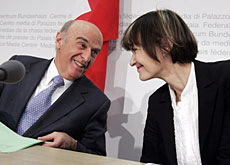Swiss agree to dialogue with EU over tax row

Switzerland and the European Union have agreed to technical talks aimed at resolving a controversy over the Swiss corporate tax system.
Both sides said on Tuesday that they would resume talking next month, and downplayed the spat. They also announced that negotiations would start in November on linking up their electricity power grids to secure supplies.
“We have differences on the tax issue, but we agree to keep on speaking together, and that dialogue will reach its goal,” Swiss President Micheline Calmy-Rey said in Brussels after a meeting with the head of the European Commission, José Manuel Barroso.
Calmy-Rey, who also met the head of EU diplomacy Javier Solana on Tuesday, added that the talks would help clarify each side’s position.
A planned meeting on November 12 in Bern will take the form of technical discussions rather than negotiations, the Federal Finance Office has confirmed.
Brussels wants the Swiss authorities to scrap a practice applied by some cantons that exempt company profits generated in EU countries from tax. It claims doing so violates a 1972 free trade accord.
Switzerland has repeatedly refused to negotiate with the EU over the issue. The government says that corporate taxes are a cantonal issue and are not covered by the trade agreement.
Despite the tax dispute, Barroso stressed the cooperation between the two sides. “I’d be happy if there were more countries with whom we have such close relations,” he said.
He said he was optimistic that there would be results and that the dispute was “not going to taint the rest of our relations, which are excellent”.
Critics say the EU-Swiss spat glosses over the big differences in corporate tax rates within the EU, with the Irish rate of 12.5 per cent close to some of the lowest in Switzerland.
Electricity market
In a parallel development, Calmy-Rey announced that the EU and Switzerland would open negotiations next month on connecting their power grids to secure supplies and prevent a repeat of the outage that plunged Italy in darkness four years ago.
Both sides want to strike a deal on power transmission fees that would make it easier for electricity operators to channel surplus energy to customers in another country.
Switzerland is ringed by EU member nations such as France, Germany and Italy that have few links to each other.
They are also seeking to harmonise power safety standards and agree to recognise each other’s certification system for green energy.
In September 2003, 95 per cent of Italy’s population was left without power after a storm shorted power lines in Switzerland, triggering a chain reaction that cut Italians’ electricity.
swissinfo with agencies
Swiss position:
Switzerland believes that the 1972 free trade accord with the European Union does not apply to the tax benefits granted to foreign companies by a number of cantons.
It argues that the 1972 agreement is only applicable to certain goods (agricultural and industrial products).
Bern also says that when the agreement was signed, Switzerland and the European Community did not foresee harmonising their legislation. Bern also argues that the rules of the trade agreement must not be interpreted in the same way as internal EU regulations on competition.
EU position:
The European Commission says that tax privileges granted by some Swiss cantons to foreign companies are contrary to the 1972 accord.
The EU is calling on Switzerland to give up the tax practice and adapt to its demands.
The tax advantages in question concern foreign holding companies whose headquarters are in Switzerland but which make profits abroad.

In compliance with the JTI standards
More: SWI swissinfo.ch certified by the Journalism Trust Initiative











You can find an overview of ongoing debates with our journalists here . Please join us!
If you want to start a conversation about a topic raised in this article or want to report factual errors, email us at english@swissinfo.ch.